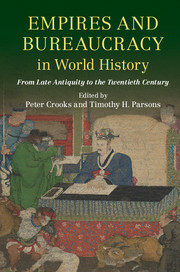Book contents
- Frontmatter
- Contents
- List of Figures
- List of Maps
- List of Tables
- List of Contributors
- Preface
- List of Abbreviations
- Part I Introduction
- Part II Empires and Bureaucracy in World-Historical Perspective
- Part III From Late Antiquity to the Middle Ages
- 6 ‘The Late Roman Empire Was before All Things a Bureaucratic State.’
- 7 Bureaucracies, Elites and Clans: The Case of Byzantium, c.600–1100
- 8 Charlemagne and Carolingian Military Administration
- 9 Bureaucracy, the English State and the Crisis of the Angevin Empire, 1199–1205
- 10 The Parchment Imperialists: Texts, Scribes and the Medieval Western Empire, c.1250–c.1440
- 11 Before Humpty Dumpty: The First English Empire and the Brittleness of Bureaucracy, 1259–1453
- Part IV From the Age of European Expansion to the End of Empires
- Part V Afterword
- Index
11 - Before Humpty Dumpty: The First English Empire and the Brittleness of Bureaucracy, 1259–1453
from Part III - From Late Antiquity to the Middle Ages
Published online by Cambridge University Press: 05 August 2016
- Frontmatter
- Contents
- List of Figures
- List of Maps
- List of Tables
- List of Contributors
- Preface
- List of Abbreviations
- Part I Introduction
- Part II Empires and Bureaucracy in World-Historical Perspective
- Part III From Late Antiquity to the Middle Ages
- 6 ‘The Late Roman Empire Was before All Things a Bureaucratic State.’
- 7 Bureaucracies, Elites and Clans: The Case of Byzantium, c.600–1100
- 8 Charlemagne and Carolingian Military Administration
- 9 Bureaucracy, the English State and the Crisis of the Angevin Empire, 1199–1205
- 10 The Parchment Imperialists: Texts, Scribes and the Medieval Western Empire, c.1250–c.1440
- 11 Before Humpty Dumpty: The First English Empire and the Brittleness of Bureaucracy, 1259–1453
- Part IV From the Age of European Expansion to the End of Empires
- Part V Afterword
- Index
Summary
‘No Caesar or Charlemagne ever presided over a dominion so peculiar’, exclaimed Benjamin Disraeli in a speech of April 1878 on what he imagined to be the singular diversity of the nineteenth-century British empire. But what about the Plantagenets? In the later Middle Ages, the Plantagenet kings of England (Figure 11.1) ruled, or claimed to rule, a consortium of insular and continental possessions that extended well outside the kingdom of England itself. At various times between the treaty of Paris in 1259 and the expulsion of the English from France (other than the Pale of Calais) in 1453, those claims to dominion stretched to Scotland in the north, Wales and Ireland in the west, Aquitaine (or, more specifically, Gascony) in the south of France and a good deal else in between. By the standards of the ‘universal empires’ of antiquity or the globe-girdling empires of the modern era, the late-medieval English ‘empire’ was a small-scale affair. It was no less heterogeneous for its relatively modest size. Rather it was a motley aggregation of hybrid settler colonies gained by conquest and lands (mostly within the kingdom of France) claimed by inheritance though held by the sword. The constitutional relationship of the constituent parts to the crown of England was vaguely defined. There were marked differences in law and custom between the dominions, and variations in the legal status of the king's subjects. Across – indeed within – the dominions, administration was geographically fragmented, and there were marked modulations in the intensity of government. Given all the diversity and flux, one might well query whether ‘empire’ is the appropriate word at all.
This essay starts from the assumption that it is the very peculiarity of the wider realm of the Plantagenet monarchs that makes it typical when considered in comparative terms as an empire. Among the structures that provided a degree of cohesion more than sufficient to warrant the ascription of that label was the royal bureaucracy. The transnational nature of this bureaucracy, and its role in creating a political culture and a shared imperial ‘space’ are key themes in the pages that follow. A second theme, paradoxically, is the brittleness of that same bureaucracy. The overseas empire of the Plantagenets was unusual in the late Middle Ages for its capacity to mobilize resources and coordinate action across geographically dispersed territories.
- Type
- Chapter
- Information
- Empires and Bureaucracy in World HistoryFrom Late Antiquity to the Twentieth Century, pp. 250 - 288Publisher: Cambridge University PressPrint publication year: 2016
- 1
- Cited by

